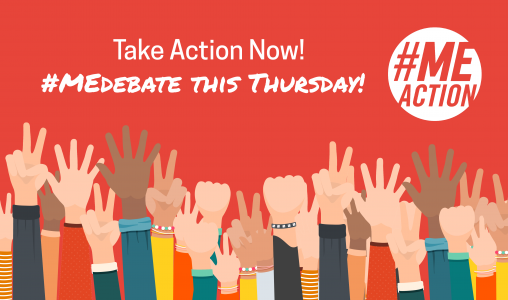Listen to this article on #MEAction’s Soundcloud here
This Thursday 24th January, myalgic encephalomyelitis (ME) will be discussed in the main chamber of the House of Commons, as Members of Parliament from all Parties debate a motion on ME put forward by Carol Monaghan MP. We want this debate to be the catalyst for substantive change for people with ME.
With the process of rewriting the NICE ME guidelines underway and the voices of people with ME starting to be heard, there has never been a more crucial time for MPs to attend this debate and put their support on record.
Having so many committed activists is the strength of our movement, and together we can make this the most successful ME debate yet. There are a range of things you can do to make sure your MP attends on Thursday. Please take as many of the following actions as you can!
- Email your MP
We’ve created a simple tool that aims to make the process of emailing your MP as easy as possible. Simply click on the button below and fill out the form, to share your ask and our briefing with your elected representative.
As this is a main chamber debate, Carol Monaghan MP has put forward a motion, calling for action. Ask your MP to vote in favour if this goes to a vote.
[maxbutton id=”21″ url=”https://act.meaction.net/page/7342/action/1″ text=”Email your MP now!” ]
The sample email sets out information about the debate and the motion MPs will be voting on, as well as key facts about the issues facing people with ME. You can also customise the email to add your own message. Use this space to outline why this issue matters to you. Remember, your story is powerful!
- Tweet your MP
If you have a Twitter account, the #MEAction tool can also help you draft a tweet to your MP. Many MPs check their accounts personally, and tweeting them is a quick and easy way to keep up the pressure.
[maxbutton id=”21″ url=”https://act.meaction.net/page/7344/tweet/1″ text=”Tweet your MP now!” ]
- Call your MP
Picking up the phone is another way to really emphasise how keen you are to secure the attendance of your MP.
MPs offices receive messages about a range of issues every day, and calling the office can help to push your message to the top of their agenda. It is likely to be a member of your MP’s office team who picks up rather than the MP themselves, but they are still useful! MP’s staff play an important role in setting their boss’ priorities.
Find your MP’s phone number by searching online here.
Read our simple toolkit with script to help you phone your MP here.
Your MP might want some more information about ME and some of the issues raised in the debate motion. You can follow up the call by emailing them with our parliamentary briefing, which you can find online here.
Let us know how you get on
So you’ve heard back from your MP… brilliant! With all of these actions, if you get any feedback from your MP, please let us know.
By compiling all this information in one place, we can target our campaigning energy where it’s most needed, and make sure our advocacy is as effective as possible.
Get in touch – please log your outcome here.
…And on the day?
Join the #MillionsMissing for our virtual demonstration from 11am GMT on Thursday 24 January! You don’t have to be in Westminster to get your voice heard.
Take a photo of yourself holding a sign supporting the #MEdebate motion, then post it to social media remembering to use the hashtag #MEdebate to help us get it trending! We’ll have more details and examples up soon!
Tune in to the debate, and tell your friends to tune in too. You can watch proceedings as they happen, live from the House of Commons chamber, on Parliament TV.
Don’t forget to follow @MEActNetUK, @meactionscot, @MEActNet on twitter and facebook for live updates, and use the hashtags #MillionsMissing and #MEdebate to join in the discussion.







2 thoughts on “What can you do before this Thursday’s ME debate?”
Creo que se debe derivar al paciente a un médico internista ,para que evalue posibles fracturas y otras enfermedades que causen fatiga .y no derivar inmediatamente a un psiquiatra y neurólogo .no mejoran a la persona la dañan más .es negligencia médica y descansa en el médico la vida del paciente ,su degeneración física
Certainly rule out other diseases and disorders — good diagnostic criteria will ensure this is the case. However, ME is still not a diagnosis of exclusion: it’s important to recognize that the Canadian Consensus Criteria (CCC) calls for specific positive signs. I do wish we could depend on our doctors to know enough to diagnose ME, but they seldom do. Many medical schools do not teach about it at all, and those who do may use outdated or erroneous information. More medical education is needed!
Comments are closed.